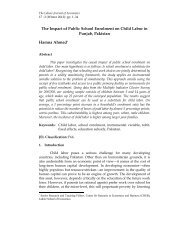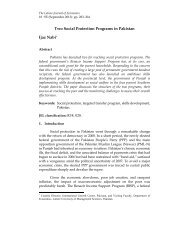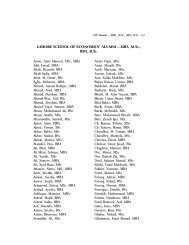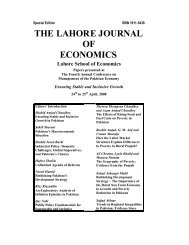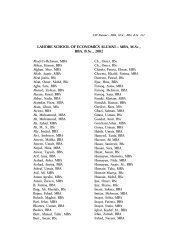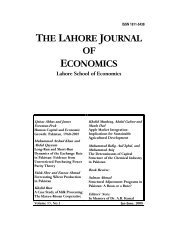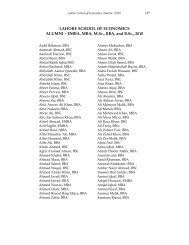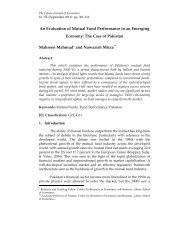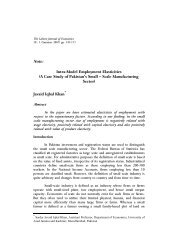Special Edition-07.pdf - Lahore School of Economics
Special Edition-07.pdf - Lahore School of Economics
Special Edition-07.pdf - Lahore School of Economics
Create successful ePaper yourself
Turn your PDF publications into a flip-book with our unique Google optimized e-Paper software.
The <strong>Lahore</strong> Journal <strong>of</strong> <strong>Economics</strong><br />
<strong>Special</strong> <strong>Edition</strong> (September 2007)<br />
Doha Round Baggage: Implications for Economic Reforms in<br />
Pakistan and other Southern Countries<br />
Naheed Zia Khan *<br />
Abstract<br />
This study is based on the premise that agriculture remains the key<br />
issue in all reform efforts <strong>of</strong> Pakistan and the Doha Round <strong>of</strong> trade talks has<br />
strategic significance for the second round <strong>of</strong> the country’s farm sector<br />
reforms. It is argued that although there are differences among the individual<br />
developing countries, the majority have a comparative advantage in<br />
agricultural production and removing farm sector export subsidies and tradedistorting,<br />
domestic subsidies is their common concern. Evidence is provided<br />
to support the view that the Uruguay Round negotiations on agricultural<br />
subsidies are not a done deal, because although signed by the members, the<br />
Agreement on Agriculture is not ‘ratified’ by the recent farm bills <strong>of</strong> the<br />
developed countries which continue to defy economic logic and the WTO<br />
(World Trade Organization). On the other hand, the evidence provided from<br />
Pakistan shows that the governments <strong>of</strong> developing countries are not fighting<br />
the farmers’ cause since they are poorly managing agricultural policy and<br />
have been overly compliant with respect to the Uruguay Round ruling on<br />
reducing farm subsidies and increasing trade liberalization. The analysis<br />
shows that although the developed countries stand to gain far more from the<br />
liberalization <strong>of</strong> trade in agricultural commodities than the developing<br />
countries, the handful <strong>of</strong> farmers in developed countries are the stumbling<br />
block to the regeneration <strong>of</strong> world trade. It is argued that to alleviate world<br />
poverty, the developed countries need to demonstrate their willingness to<br />
gradually remove both the absolute value <strong>of</strong> subsidies provided to their<br />
farmers and the tariff and non-tariff barriers that protect agriculture.<br />
Finally, the author maintains that at world trade forums, the developing<br />
countries have exhibited poor representation due to lack <strong>of</strong> leadership.<br />
Introduction<br />
The external sector is a fundamental policy concern <strong>of</strong> both the<br />
first and second generation economic reforms in Pakistan. In an economic<br />
* Pr<strong>of</strong>essor <strong>of</strong> <strong>Economics</strong>, Fatima Jinnah Women University, Rawalpindi.



